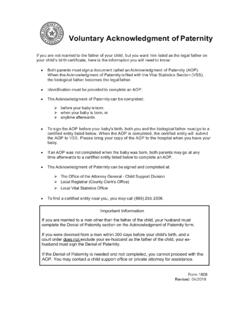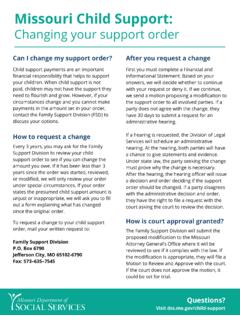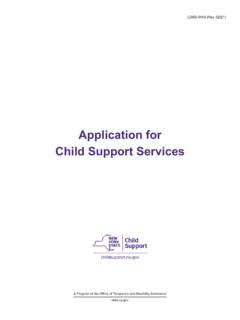Transcription of FREQUENTLY ASKED QUESTIONS ABOUT CHILD SUPPORT
1 FREQUENTLY ASKED QUESTIONSABOUT CHILD SUPPORTMISSIONSTATEMENTThe CHILD SUPPORT Division in the Office of the Attorney General assists parents in obtaining the financial SUPPORT necessary for children to grow up and succeed in life. To encourage parental responsibility, the Office of the Attorney General establishes paternity of children, establishes court orders for financial and medical SUPPORT , and enforces SUPPORT Attorney General promotes the involvement of both parents in their children's lives by working with commu-nity groups, schools and hospitals. In the performance of their duties on behalf of Texas children, CHILD sup-port staff focus on quality, efficiency, effectiveness and customer service.
2 Custodial parents can call the 24-hour hotline at (800) 252-8014 to receive automated information. With their customer identification numbers (CIN), they can receive information on payments and case status without having to wait for a caseworker. FREQUENTLYASKED QUESTIONSSERVICES what does the CHILD SUPPORT program do? The Office of the Attorney General is responsible for: locating absent parents; establishing paternity; establishing, enforcing and modifying CHILD and medical SUPPORT orders; and collecting and distributing CHILD SUPPORT can apply for CHILD SUPPORT services and what is the fee?
3 The Attorney General s Office accepts applications from mothers, fathers and other individuals who request services. Our attorneys represent the State of Texas in providing CHILD SUPPORT services and do not represent either parent in the case. Customers do not have the right to select what enforce-ment actions are taken in their cases. The Office of the Attorney General is required to provide all appropriate services for the benefit of the children. Temporary Assistance for Needy Families (TANF) and certain Medicaid recipients automatically receive CHILD SUPPORT services after they are certified for public assis-tance.
4 Persons who do not receive TANF or Medicaid must apply for CHILD SUPPORT services. There is no charge to apply for CHILD SUPPORT services. Many services are provided at no cost. Effective October 1, 2011, custodial parents with full-service cases who have never received Temporary Assistance for Needy Families (TANF) will pay a $25 fee each year that they receive at least $500 in CHILD SUPPORT collections. Fees will be deducted from CHILD SUPPORT payments. Parents who have more than one CHILD SUPPORT case will pay a fee on each case that meets the criteria. Where do people apply for CHILD SUPPORT services with the Office of the Attorney General?
5 The CHILD SUPPORT Division of the Office of the Attorney General operates field offices throughout the state 4where people may apply for services. The telephone numbers and addresses for these offices can be found at A parent also can request an application for services by calling our toll-free telephone number at (800) 252-8014 or by visiting our website. An applicant who is deaf or hard of hearing can call Relay Texas toll free by dialing 711 or (800) RELAY TX (735-2989).How long before payments begin? Obtaining CHILD SUPPORT involves a wide variety of fac-tors, making it difficult to predict the time required to secure payments on individual cases.
6 For example, one case may require the full range of services locating the absent parent, establishing paternity and a SUPPORT order and enforcing the order . Another case may have a divorce decree with an established order , a Social Security number, and an employer for the noncustodial parent, allowing enforcement of payment through an administrative income withholding order . What information does the Office of the Attorney General need to locate a noncustodial parent? The most important information an applicant can pro-vide, aside from the noncustodial parent s current address, is the name and address of the noncustodial parent s current employer.
7 If the current employer is not known, the name and address of the last known employer should be provided. 56 Additionally, the following information ABOUT the non-custodial parent should be provided, if known: Social Security number and date of birth; names and addresses of relatives and friends; names of banks or creditors such as utility companies; names of organizations, unions or clubs to which the noncustodial parent belongs; and places where the noncustodial parent spends free time. What documents are needed by the Office of the Attorney General? If available, CHILD SUPPORT applicants should submit copies of the following: the divorce decree, separation agreement or court order for CHILD SUPPORT ; the acknowledgment of paternity, if one has been signed; the birth certificate(s) of the CHILD (ren) involved; all documents reflecting both parents incomes and assets (paycheck stubs, tax returns, bank statements, etc.)
8 ; and evidence of CHILD SUPPORT payment history. How do TANF recipients seek CHILD SUPPORT ? To receive TANF benefits through the Texas Health and Human Services Commission, recipients must cooper-ate with the Office of the Attorney General s efforts to identify the CHILD (ren) s noncustodial parent and collect CHILD SUPPORT . TANF recipients must assign to the State their right to CHILD SUPPORT collections. Payments collected in the case while the family receives TANF benefits are applied toward reimbursing the state and federal governments for TANF benefits received by the family.
9 However, the family will receive as a "pass-through" the first $75 col-lected during any month that a current CHILD SUPPORT payment is made. When the family no longer receives TANF, all current CHILD SUPPORT payments are sent to the custodial have some CHILD SUPPORT issues, but I am deaf. How do I go ABOUT communicating with the Attorney General s Office?You may call Relay Texas toll free by dialing 711 or (800) RELAY TX (735-2989). When you call, please have the fol-lowing information available: your name, Social Security number and TTY number. You also may learn valuable information on the Attorney General s website at if a person no longer wants the Office of the Attorney General s services?
10 If the custodial parent no longer receives TANF or Medicaid and wishes to discontinue CHILD SUPPORT enforce-ment services, the case will be reviewed for case closure. In most instances, payments on closed cases will con-tinue to be processed by the State Disbursement Unit until further order of the can CHILD SUPPORT be changed?Only the court can modify the CHILD SUPPORT order . It can-not be done by agreement of the parties. Grounds for a modification include a material and substantial change in the circumstances of a CHILD or a person affected by the order , or the passage of three years since the last CHILD SUPPORT order and a difference in monthly payment by either 20 percent or $100 from the CHILD SUPPORT guidelines.
















